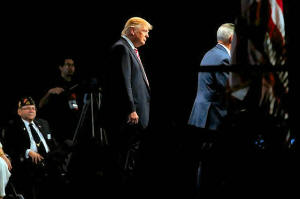|
Trump's gains
came as he accepted his party's nomination to the Nov. 8 ballot
at the four-day Republican National Convention in Cleveland last
week, and as Clinton's nomination in Philadelphia this week was
marred by party divisions and the resignation of a top party
official.
The July 22-26 poll found that 39 percent of likely voters
supported Trump, 37 percent supported Clinton and 24 percent
would vote for neither. The poll had a credibility interval of 4
percentage points, meaning that the two candidates should be
considered about even in support.
Clinton held a three-point lead on Friday, which was also within
the credibility interval.
Clinton has solidly led Trump in the poll throughout most of the
2016 presidential race. The only times that Trump has matched
her level of support were when the Republican Party appeared to
be roughly aligned with his campaign.
In early May, Trump briefly pulled even with Clinton after his
remaining rivals for the party nomination dropped out of the
running. He held a 0.3 percentage point lead over Clinton on May
9, the last time he was nominally ahead.
Trump fell back in the poll as he feuded with party bosses over
comments he made about Hispanics, Muslims and immigrants, but he
rebounded this month as his candidacy took the national
spotlight at the Cleveland convention.
The Democratic party is hoping for a similar boost during its
convention this week in Philadelphia, but the confab had a rough
start: the Wikileaks website released emails on Friday that
enraged many voters who had supported Clinton's rival for the
nomination, Senator Bernie Sanders of Vermont, showing that
party officials had looked for ways to undermine his candidacy.
The chair of the Democratic National Committee, Debbie Wasserman
Schultz, announced her resignation afterward.
On Monday, some speakers at the Democratic convention were booed
by Sanders supporters, and hundreds of protesters took to the
streets to protest Clinton's candidacy.
Presidential candidates usually get a boost in popularity
following their party conventions.
In 2012, Republican nominee Mitt Romney jumped by 5 percentage
points to pull about even with President Barack Obama after the
Republican convention. After the Democrats held their
convention, Obama then rose by a few percentage points and again
pulled ahead.
The Reuters/Ipsos poll was conducted online in English with
about 962 likely voters.
(Editing by Richard Valdmanis and Leslie Adler)
[© 2016 Thomson Reuters. All rights
reserved.] Copyright 2016 Reuters. All rights reserved. This material may not be published,
broadcast, rewritten or redistributed.
 |
|






